6 Moments When China’s Internet Privacy Creeped Us Out
Alibaba was in a little trouble last week.
On Jan 3rd, Alipay launched its Annual User Footprint Report that analyzes how consumers have spent their money over the past year. Within a few hours, everyone was sharing screenshots of their own report on WeChat Moments, comparing their consumer keywords - a personalized label endowed by Alipay’s algorithms (for instance, if you bought lingerie on Taobao last year, your keyword would probably be “sexy”. If you used Alipay to pay for Ofo or Mobike rides frequently, you'd be “athletic” by big data standard). The overall mood was very cheerful: it was only three days into the new year, and what’s a better way to celebrate and self-entertain in today's China than showing off your purchasing power?
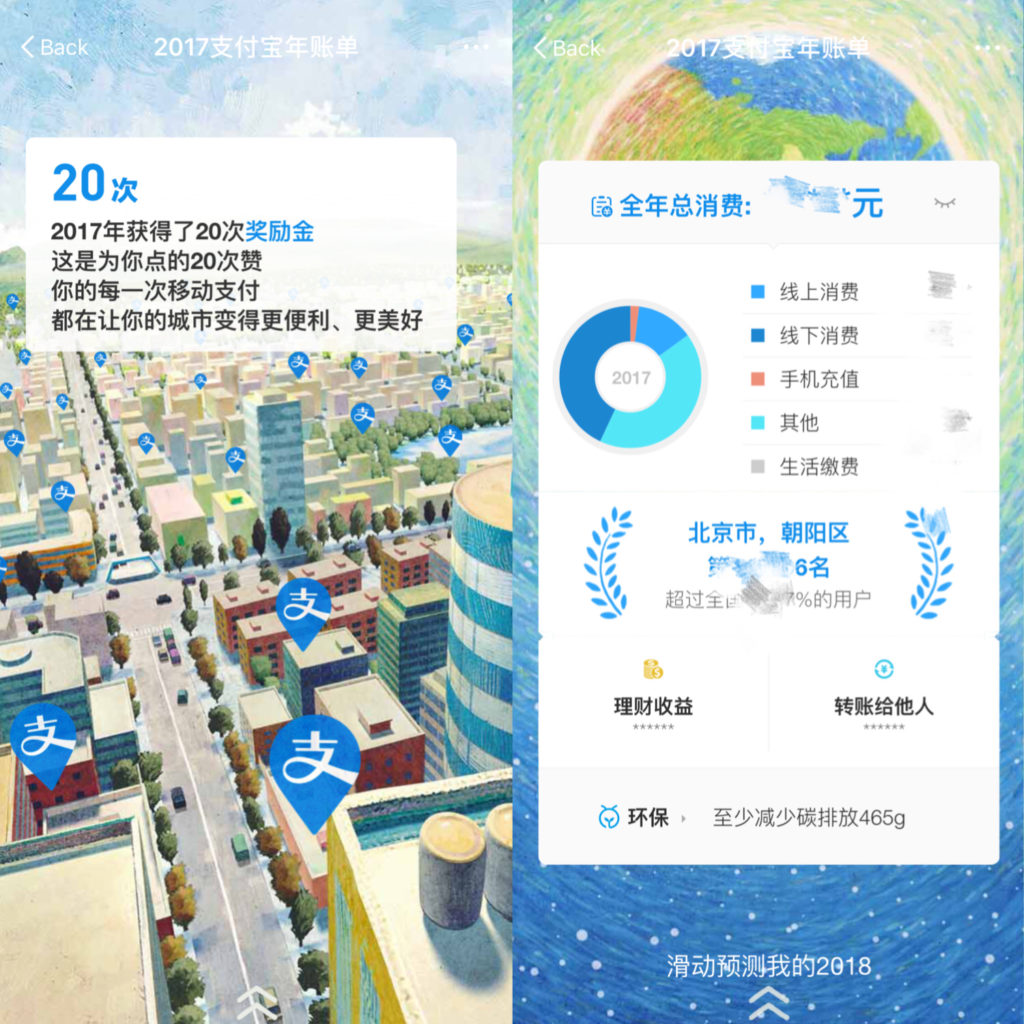
Alibaba's annual report compares one's spending with everyone else in the city.
-

The individualized keywords at the end of the report went viral on Chinese social media.
Such joy nonetheless was soon disturbed by a lawyer’s Weibo, which warned people about a tiny button checked by default on the report’s landing page (see below). By agreeing it automatically, users were allowing Sesame Credit, the credit scoring system of Ant Financial, to collect, analyze their personal data and share with third-party institutions. While many people were still busy showing off their bills, others were outraged and began to accuse Alipay for infringement of their privacy. The next day, both Sesame Credit and Alipay apologized, cancelling the default option and allowing those already enrolled to deselect the service in the app.
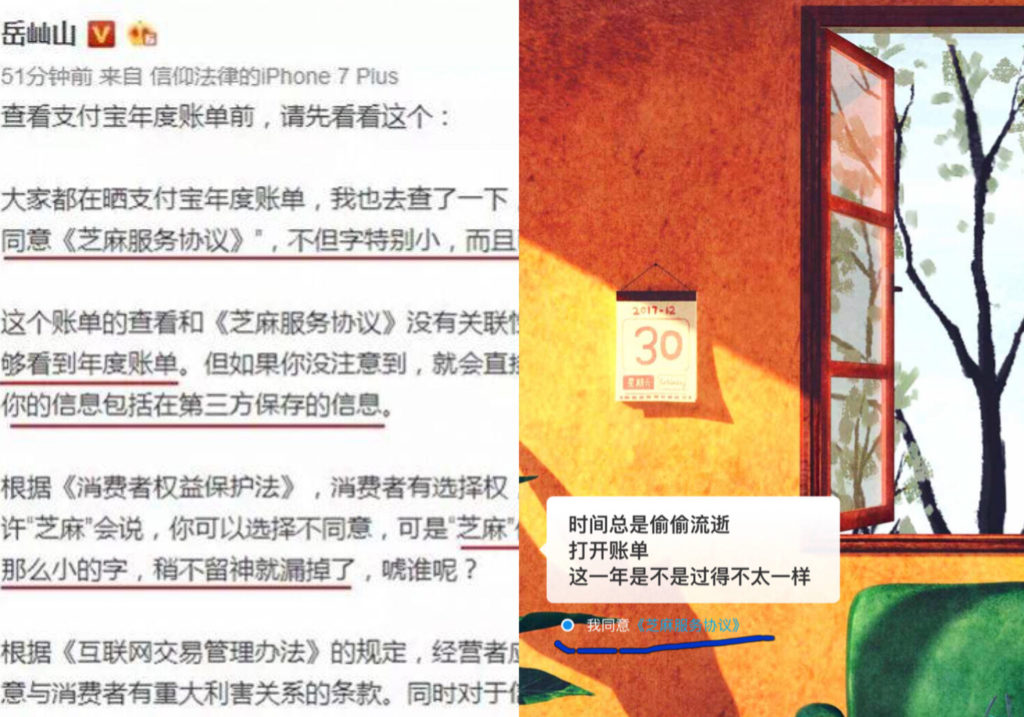
Left: Laywer Yue's weibo. Right: The checked-by-default licensing agreement.
The incident got us thinking. As two Chinese consumers living in Beijing, we personally experienced the country’s dramatic internet development over the past few years. We absolutely loved and celebrated it fanatically as every Chinese did, yet in a number of occasions, we were also discomforted and even creeped out by China’s now knowing-you-too-much internet. Those were such small and subtle moments – in most cases, we were not even bothered to feel annoyed, generously allowing the joy of convenience overwhelming our consciousness minds. But the truth is these moments do matter, and now is time to dig them out and let the uneasiness sink in.
1.When Taobao knows what you want before you want it.
On the landing page of Taobao’s mobile app hangs a section called “有好货 the Good Things”, which recommends products to users based on their individual shopping history. It’s a thing that every e-commerce stores do nowadays: yelling “I KNOW YA!!” to the consumer's face, shamelessly turning out 10 more USB cables after you purchased the only one you needed (Hey Amazon!).
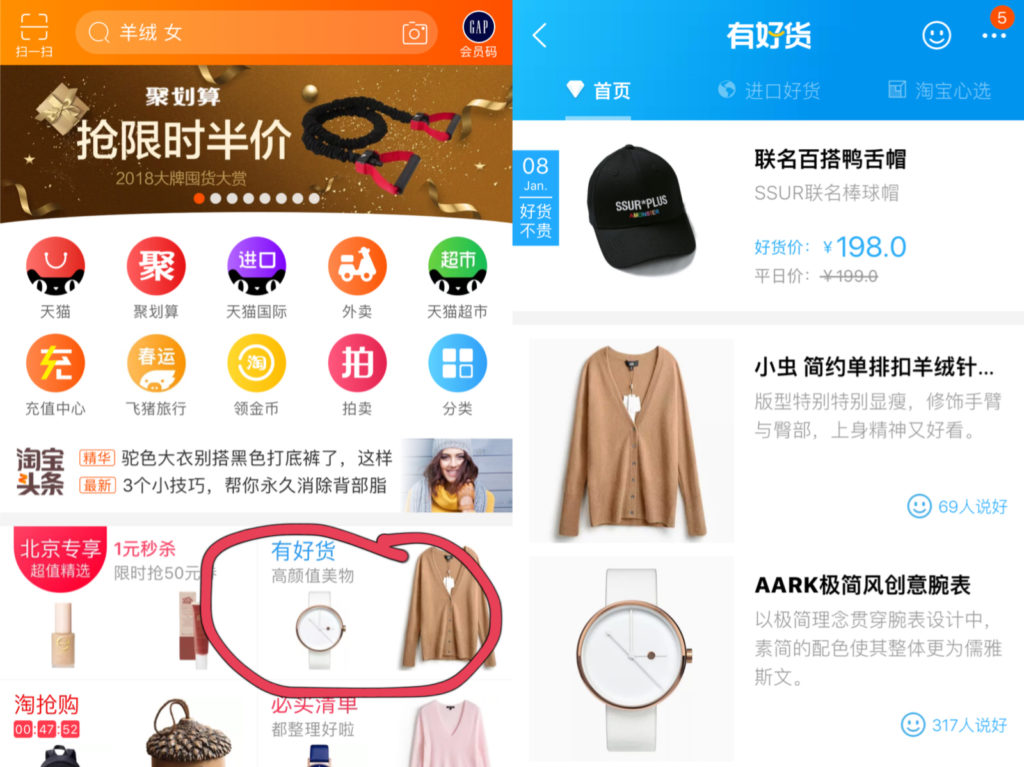
The Taobao entrance of endless hand-chopping desires.
E-commerce algorithms are aggressive in nature, but Taobao is going a bit too far. Once I searched “skiing” on Weibo to look for a certain snow athlete, a minute later when I opened Taobao, the "有好货 the Good Things" section was already filled with skiing equipment and snow gears. Even creepier was after I took a photo of some blueberries and saved it to album, Taobao’s search engine immediately suggested “blueberry” as a key word.
I wasn’t planning to buy any blueberries, but a click into that damn keyword led me into a whirlwind world of fresh/frozen/dried/important/local blueberries from 10,000+ Taobao shops. I was totally lost. I eventually bought a box of “fresh Brazil important top-quality” blueberries.

When you were in a blueberry wonderland and didn't even know you wanted blueberries...
2.When cashless life comes with a price.
Over the past few years, Alipay and WeChat Pay have been competing fiercely for market share by expanding into every corner of our lives. Every time you need to pay for something, from buying freshly pressed orange juices from a vending machine to paying parking fee, all you need to do is to take out your phone, scan that QR code (through Alipay or WeChat), wait for a few seconds, and voila!
But the magical voila comes with baggage. Sometimes it is having to subscribe to random business accounts that bomb you with ads and personalized greeting messages on your already information-loaded WeChat, sometimes it is having to bond personal information such as your license plate to your WeChat account. When Yan and I was leaving a shopping mall once, the concierge staff said we could enjoy free parking as along as we both follow the mall’s WeChat account, submit our phone numbers and then pay through WeChat. We hesitated for a moment, yet eventually gave in since we were too tired to find an ATM machine for that damn 30 RMB parking fee.
We get it, every short-term convenience in life comes with long-term price. But no, we jut couldn't stop giving in.
3.When you accidentally know too much about your friends.
Yep, this is the eternal trap of today’s social-is-immortal internet. In the case of the Chinese internet and Chinese apps, two things made us felt extra trapped:
a) When Dianping keeps telling you where your friends have been.
Long gone the days when Dianping was still “the Chinese Yelp”. Today, every Chinese person uses Dianping for every stage of a consumer experience, from choosing a restaurant(or a cafe/ spa/cinema and more), reserving a table to getting a discount code, ordering and checking out. Dianping is awesome, Dianping is useful, but Dianping, just like all the other Chinese apps, fears itself to be not social enough: today, as soon as you connect Dianping with WeChat (which is what most people do), you’d immediately be attacked with check-ins, reviews and photos from your WeChat friends right on the app's landing page.
Let’s face it: most of our WeChat “friends” are not really friends anyway, and who cares if that guy visited that famous boutique coffee shop with that beautifully-made latte?! (nope, we DON’T care!)
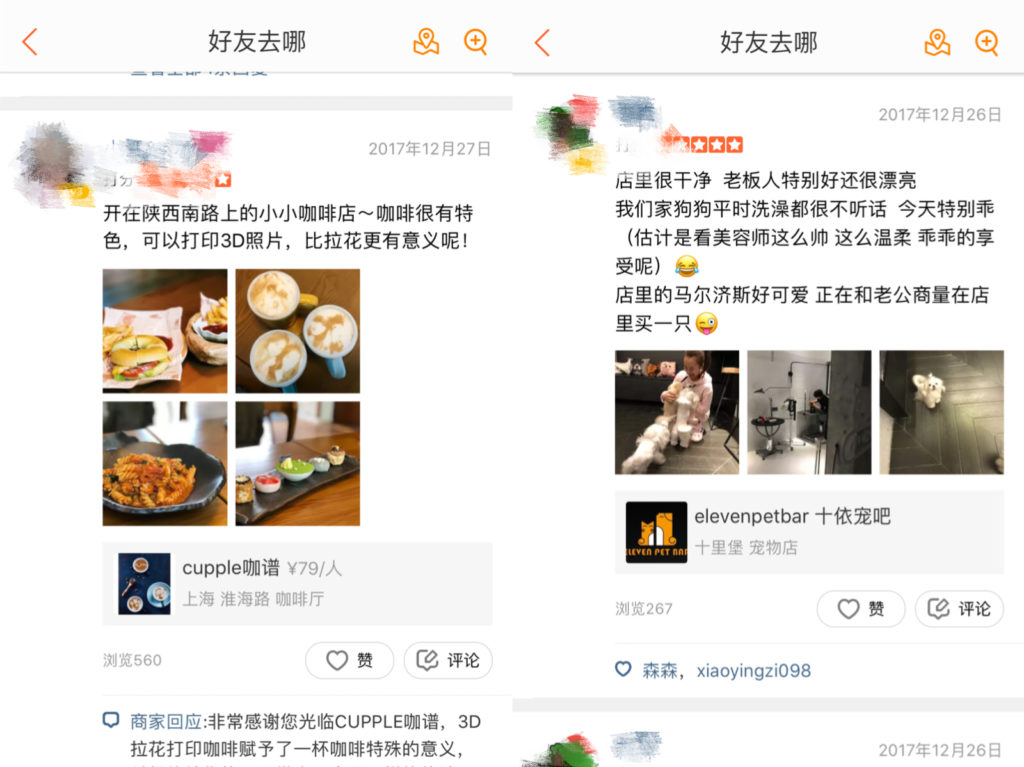
Too much information, too much...
b) When WeRun refuses to shut up reporting your daily steps.

For one thing, I know so many people who absolutely love WeRun, a pedometer program that ranks the daily steps of all your WeChat contacts. Before Beijng’s weather got unbearably freezing, my mom would religiously walk over 10,000 steps every day, shaking her phone (there are now even automated phone shakers on Taobao for those who prefer to cheat) while constantly checking how many more steps she had progressed. I was glad to see her becoming so athletic until one day, when I heard a conversation between my mom and her friends -
- “Oh darling, you look so fit now! Those WeRun steps of you for sure helped!”
- “Thanks honey! Your (steps) ranking has been pretty high too! I remember giving you likes for so many days!” (After completing her daily 10,000 steps, my mom would like those who also completed 10,000 steps, and most of them would like back too. )
- “Oh no, I’ve not been so good! Your ranking has been way better, I admire you so much!”
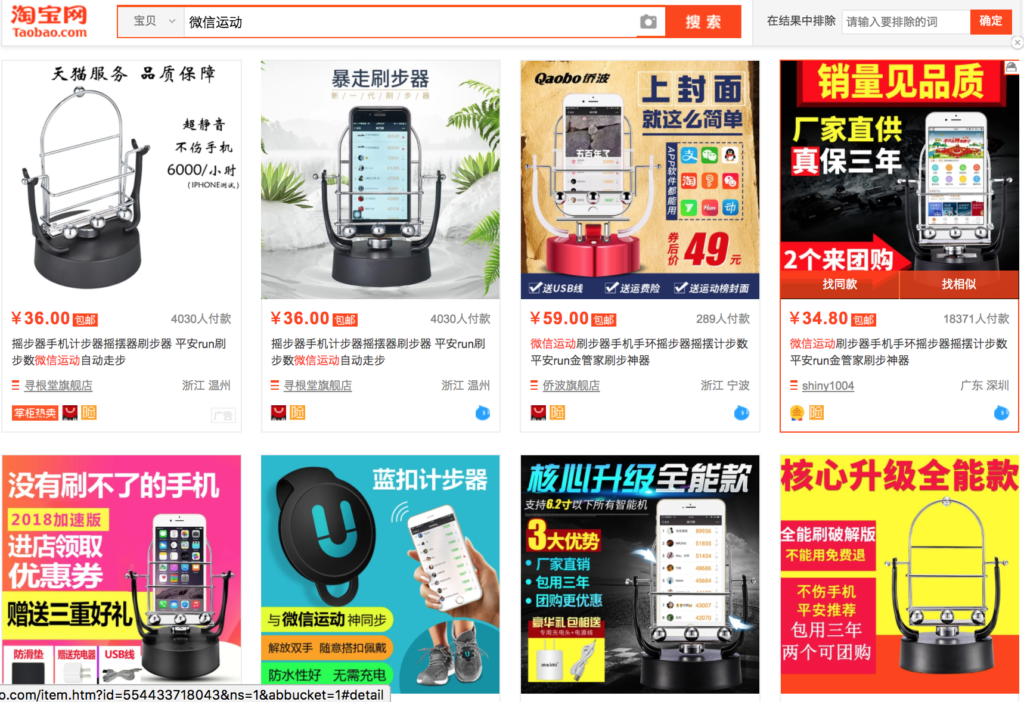
WeRun cheaters/phone shakers on Taobao.
I see how the competitive + social element has made this WeChat walking game extra fun for many people , at the same time, it troubles those of us who prefer to stay idle and not to care about that runner friend who keeps achieving more than 20,000 steps every day. Life is tough enough, now WeChat is not even letting us to be lazy. Ridiculous! Unbearable! ( *Trump tweet tone)
4. When every bit of your personal information is bare out on that take-out invoice stapled to the paper bag.
From a Meituan food delivery yesterday: the smudged part shows my full address, my entire phone number and my name.

5. When you contact a real-estate agency and all the other agencies in Beijing know what you were looking for.
Last week, Yan and I were online searching for a new office space in Beijing. We saw a pretty decent one on Ganji (a classified advertisement platform like craigslist), called the listed agency, and learned the space was too big to our liking. Since we were not in a hurry to move, we decided to dropped the office-hunting agenda and try another day.
But dropping it turn out to be impossible. After we called for that particular office, I’ve been receiving texts and calls from four other real-estate agencies in the city, each recommending specific spaces based exactly on my requests. I did not register my information anywhere, so where on earth did they learn what I need? Well, according to one of the agents who called, inquiries like mine were "shared information" that everyone in the industry has access to.
Now tell me if this is not creepy enough.
6.When your message mysteriously disappears on WeChat.
On July 13rd 2017, Liu Xiaobo, the Nobel-award Chinese intellectual who was jailed for his pro-democracy activism, passed away in prison.
The moment Yan and I learned about Liu’s death, we just boarded the high-bullet train for a work trip to Shanghai. We bowed our heads down to Weibo and WeChat for the entire train journey, witnessing grieving messages popping up and being scrubbed away in just a few hours’ time. Most people who spoke up knew their posts wouldn’t survive long, but they still talked and mourned, posting candles, pictures and poems in memory of Liu’s life. When Yan and I arrived Shanghai later in the evening, censorship on Liu had went into overdrive. The candle emoji disappeared on Weibo, and every trace of news on his death was smudged away.

People comemorating Liu's death. (Photo from: Quartz)
But things did not just stop there. Eventually, censorship reached into private WeChat messages, operating different filtering mechanism between Chinese and oversea-registered accounts. We asked a friend to send a comic consisting of Liu and his wife, drawn by exiled artist Badiucao, to us separately, and were haunted by what then happened: that photo was received from my end since my WeChat account was registered with a U.S phone number; on Yan’s WeChat however, it never showed despite a confirmed sent from our friend.

The picture that never got through.
![]()
Having ranted enough on our lives and technology in China, we want to take a step back and think about the relationship between privacy and internet on a cross-cultural level. For one thing, privacy and personal security are now serious, universal problems of our human world; in today's capitalistic digital society, no company could reject the allure of data, and no users hold the power to erase it all. From this perspective, China's internet companies are merely following what the others have done, pushing, extracting and demanding consumers under the name of provision and development.
What makes the Chinese case special, at least from the consumers' standpoint, are two things. Firstly, the way Chinese companies operate their privacy-intruding schemes are much more aggressive, exposing the often hidden tricks and scams right to the face of the consumers. Secondly, with an authoritative regime that censors everything and places security cameras everywhere, to talk about privacy in China is still more or less, well, a joke.
Sorry for ending on a pathetic note (again!). Anyway, we will see you soon with another story.
xxxx,
Yan and Biyi


What’s sad is that we all know these things are happening but we can do nothing to solve them, and gradually we would even get used to these shits.
Really well written, easy to read and captivating. The saddest thing for me is how unaware people seem about all of the above. Can I find you guys on facebook or wechat?
“with an authoritative regime that censors everything and places security cameras everywhere, to talk about privacy in China is still more or less, well, a joke.”
Agreed! And with an authoritative regime that censors everything and places security cameras everywhere, to talk about privacy in the USA is still more or less, well, a joke, too.
Thanks for your post. The direct descriptions of how technology impacts everyday life in China is missing in most news articles on this topic.
@Godfree Roberts. I lived in China over half a decade and I can see your trying to say all is equal good or bad but if you had lived in China you wouldn’t be able to say what you did if it was about China. At least in the States you can criticize to a large extent whereas in China even reporting something like true pollution levels can be means for the police to knock on your door. The United States and its companies share personal data but the fact that we have much better legal recourse than Chinese citizens… Read more »
It’s authoritarian regime, not authoritative regime.
Otherwise, great article. I live in China and I personally try and stick to using cash as much as possible, because I don’t like the idea that the powers that be should know exactly where I’ve been and how much I’ve spent every single day. Not that I have anything to hide, but it’s a matter of principle. My friends now look surprised that I still carry cash with me.
Once the book “Quality Land” has been translated into English, please read it asap. It will make you laugh for how similar many aspects of life in this dystopia described by the author are to what you are describing in today’s China.
Well, at least you can walk around without worrying about getting shot.
[…] is seeing companies like Alibaba and Tencent feasting on bits and bytes with unbridled gluttony. Here are some of the creepy going-ons. Yet there are signs of consumers’ data generosity waning. Earlier this year, just days after […]
@Skeleton Man:
I’m in London right now, and I walk around without fear of getting shot here too. In fact, I generally feel safer than I do in China.
[…] op konden vragen over hun bestedingspatroon in het voorafgaande jaar bleek gepaard te gaan met een automatische opt-in voor Sesame Credit, het kredietwaardigheidsysteem van het bedrijf, als men akkoord ging met de […]
[…] hardly news that WeChat, China’s biggest social app, is invading our privacy too. Will there ever be a #deletewechat movement in China? And if so, would we join […]